 MyDogBreeds
MyDogBreeds Both Shepherd Husky and Australian Shepherd are originated from United States. Shepherd Husky may grow 6 cm / 3 inches higher than Australian Shepherd. Shepherd Husky may weigh 8 kg / 18 pounds more than Australian Shepherd. Both Shepherd Husky and Australian Shepherd has almost same life span. Both Shepherd Husky and Australian Shepherd has almost same litter size. Both Shepherd Husky and Australian Shepherd requires Moderate maintenance.
Both Shepherd Husky and Australian Shepherd are originated from United States. Shepherd Husky may grow 6 cm / 3 inches higher than Australian Shepherd. Shepherd Husky may weigh 8 kg / 18 pounds more than Australian Shepherd. Both Shepherd Husky and Australian Shepherd has almost same life span. Both Shepherd Husky and Australian Shepherd has almost same litter size. Both Shepherd Husky and Australian Shepherd requires Moderate maintenance.
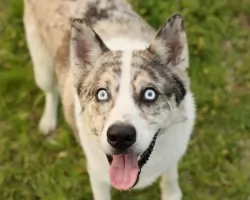 What a beautiful dog the Shepherd Husky is. He is a mix between the Husky and the German Shepherd. Other names for him include Gerberian Shepsky, German Husky and Siberian Shepherd.
What a beautiful dog the Shepherd Husky is. He is a mix between the Husky and the German Shepherd. Other names for him include Gerberian Shepsky, German Husky and Siberian Shepherd.
The German Shepherd originated in Germany and the Husky is from Siberia. We assume this mixed breed dog was bred in the USA. The true origin of the German Shepherd Husky dog is unclear but both the parent breeds have long histories.
The dog is recognized as a Hybrid by both the Dog Registry of America as well as the American canine hybrid Club.
 The Australian Shepherd, known fondly as ‘Aussies’, is actually an American breed, with the first official registry being in the 1950s. Basque Shepherds from Spain settled in Australia at the end of the 19th century, later moving to the United Stated with their dogs in tow. It is from these dogs that the breed originated. In the UK too, this breed of dog has many enthusiastic followers.
The Australian Shepherd, known fondly as ‘Aussies’, is actually an American breed, with the first official registry being in the 1950s. Basque Shepherds from Spain settled in Australia at the end of the 19th century, later moving to the United Stated with their dogs in tow. It is from these dogs that the breed originated. In the UK too, this breed of dog has many enthusiastic followers.
For many years, the Australian Shepherd has been recognized for their wonderful abilities as stock- or herding dogs, and today in Australia they continue to work as stock dogs and often take part in herding trials.
More recently, this working dog breed has been selectively bred to develop both Toy- and Miniature Aussies, and the American Stock Dog Registry actually recognizes 3 sizes today.The Australian Shepherd Club of America was also founded in 1957 to promote the breed.
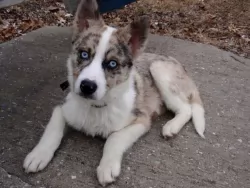 Solid and strong, the German Shepherd Husky mix is attractive. He is a fairly large dog standing at 51 to 64cm in height and weighing between 20 to 40kg.
Solid and strong, the German Shepherd Husky mix is attractive. He is a fairly large dog standing at 51 to 64cm in height and weighing between 20 to 40kg.
They’re powerful dogs these as they have a long history of being working dogs. The eyes of this beautiful dog can be brown, green or blue or a mix of these. The thick double coat protects them from the cold and in the warmer months, he sheds quite a bit.
The coat can be brown, black and tan or it can have creamy shades and be mixed with grey and white too.
The Shepherd Husky is a friendly, amicable dog who wants to please his owner. Training and socialization make him even more well adjusted. He is a dog that will get on well with children in the home as well as other dogs.
He is such an all rounder this dog – loyal, intelligent, social and loving - being great for accompanying you on walks and hikes but being willing to sit with you indoors too.
While he is adaptable and good natured and will happily live with his owner in the city or the countryside, he is better suited to life in the countryside. He also makes a great guard-dog.
 Similar in appearance to the Border Collie, the Australian Shepherd is a medium sized dog and has a medium length coat which is straight to wavy with a weather resistant undercoat. The range of coat colours is amazing, and you’ll find blue, blue merle, black and red merle and all of these are with or without tan points. The Australian Shepherd is a drop-eared breed where prick ears are sometimes seen. Some Aussies are born with naturally bobbed tails while most have full, long tails.
Similar in appearance to the Border Collie, the Australian Shepherd is a medium sized dog and has a medium length coat which is straight to wavy with a weather resistant undercoat. The range of coat colours is amazing, and you’ll find blue, blue merle, black and red merle and all of these are with or without tan points. The Australian Shepherd is a drop-eared breed where prick ears are sometimes seen. Some Aussies are born with naturally bobbed tails while most have full, long tails.
There is variety in the eye colour too, and they are often heterochromatic, which means that they can have two different coloured eyes or the one eye can even be bi-coloured. Most times the eyes are brown, but they can be blue too.
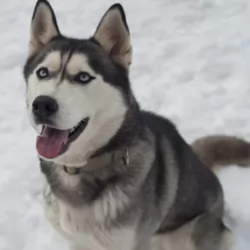 The German Shepherd Husky mix is such an ideal dog for single people, couples and families. This wolf-like breed is intelligent, loving,social and protective – the ideal family dog.
The German Shepherd Husky mix is such an ideal dog for single people, couples and families. This wolf-like breed is intelligent, loving,social and protective – the ideal family dog.
For those looking for an active dog that can be their jogging, walking and camping partner, this dog is for you. He loves to be busy, but he also loves being made a fuss of indoors too.
He has so many excellent qualities and is one dog breed that ticks all the right boxes for being such an all-round splendid pet and companion.
 The Australian Shepherd is an intelligent dog, learning quickly. As a herding dog, he also has strong guarding instincts and will make a good watch dog. The dog has a balanced, even disposition, and even though he may show some reserve, he is certainly not a shy dog and isn’t aggressive.
The Australian Shepherd is an intelligent dog, learning quickly. As a herding dog, he also has strong guarding instincts and will make a good watch dog. The dog has a balanced, even disposition, and even though he may show some reserve, he is certainly not a shy dog and isn’t aggressive.
Your Aussie is a kind, loving, and devoted pet. He loves his human family and wants to spend lots of time with them. Don’t leave him without human companionship as he craves it and forms strong bonds with his family. Provide him with good care and with lots of fun and games and you’ve got an exceptional friend for life.
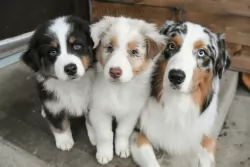 This is such a robust dog that you an scarcely think of him being sickly and yet there are some illnesses that are common to all dogs and which your German Shepherd Husky mix might get as well.
This is such a robust dog that you an scarcely think of him being sickly and yet there are some illnesses that are common to all dogs and which your German Shepherd Husky mix might get as well.
Hip dysplasia is common in German Shepherd dogs as well as arthritis and thyroid dysfunction. Bloat and cancer are other diseases to watch for.
Canine hip dysplasia is a genetic disease characterised as a disease of the hip. The malformation can lead to arthritis and pain and ultimately lead to the loss of hip function, crippling your dog.
You will need to get your pet to the vet for treatment to make his life more comfortable.
 Aussies are a healthy breed and won’t cost you a fortune at the vet. However, like every other breed, they are also prone to certain health conditions such as cancer. When choosing a puppy, always look for a good, reputable breeder who can show you health clearances.
Aussies are a healthy breed and won’t cost you a fortune at the vet. However, like every other breed, they are also prone to certain health conditions such as cancer. When choosing a puppy, always look for a good, reputable breeder who can show you health clearances.
This is a dog ailment that can be inherited. It is where the femur doesn't fit properly into the pelvic socket of the hip joint. Also, as the dog ages, arthritis can develop.
Epilepsy an hereditary disorder where the seizures your dog gets can be treated and controlled.
Osteochondrosis Dissecans, commonly known as OCD is an orthopedic condition which comes about because of improper growth of cartilage in the joints. It can cause painful stiffening of the elbow joint for instance.
Progressive Retinal Atrophy or PRA is a degenerative eye disorder that can finally lead to blindness. Reputable Aussie dog breeders have their dogs' eyes certified regularly by a veterinary ophthalmologist.
Your newborn Australian Shepherd may well be strong and healthy, but he isn’t immune from life-threatening illnesses. Vaccinations are imperative for your Aussie puppy, with vets usually recommending that puppies be vaccinated for the first time from 6 to 8 weeks of age.
These vaccinations will include the 5-in-one and includes Parvovirus, Distemper, Hepatitis and Parainfluenza. Later on the puppy will get his first rabies shot and he will also require booster vaccinations.
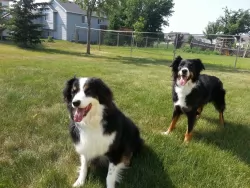 ◆Brush the coat of your Shepherd Husky twice a week to rid the coat of loose hairs. This dog’s hair sheds quite heavily as the weather warms and he may require brushing more often.
◆Brush the coat of your Shepherd Husky twice a week to rid the coat of loose hairs. This dog’s hair sheds quite heavily as the weather warms and he may require brushing more often.
◆When you brush him, check the ears and eyes for infection. The eyes must be bright and clear.
◆Feed your Shepherd Husky the best food there is as he is an energetic, working breed. The commercially manufactured foods can be a good, convenient choice but you need to make sure it is one of the better brands.
Some of the cheaper brands are full of bad ingredients that can make a dog sick.Try and give him some home-made foods that are healthy and nutritious. This food can be added to his dry kibble twice a week.
Boiled chicken, brown rice or pasta and spinach, sweet potatoes and carrots are a tasty healthy choice for your pet. Try and include some raw meat into the diet as well.
 With his medium length coat, the Australian Shepherd sheds. In fact this particular breed sheds his hair the entire year round, but you’ll notice that with the arrival of Spring, he sheds more as this is when he is losing his Winter coat. You will most certainly need to brush his coat at least 2x a week to get rid of all those tufts of hair and to also prevent matting.
With his medium length coat, the Australian Shepherd sheds. In fact this particular breed sheds his hair the entire year round, but you’ll notice that with the arrival of Spring, he sheds more as this is when he is losing his Winter coat. You will most certainly need to brush his coat at least 2x a week to get rid of all those tufts of hair and to also prevent matting.
A puppy will need 4 bowls of vet-recommended food a day. How much your adult Australian Shepherd gets will depend on his age, size and activity levels.The quality of food you buy will make a difference as it will keep your Aussie in good shape. Remember to include raw or cooked meat into his diet once a week or so. For more on feeding your Aussie, speak to your vet. Always ensure a constant source of fresh, cool water.
The Australian Shepherd is a strong willed dog, used to playing the dominant role with the herding of livestock. He’ll need firm training and socialization if you want to make him an amicable family pet.
Like many herding dogs, Australian Shepherds are loyal to their family and don’t easily take to strangers. Aussies make awesome companions for families with kids who have been taught how to treat dogs and other pets with kindness and gentleness. Just like a dog needs socialization, a child needs to respect a sleeping, feeding dog and to leave him in peace.